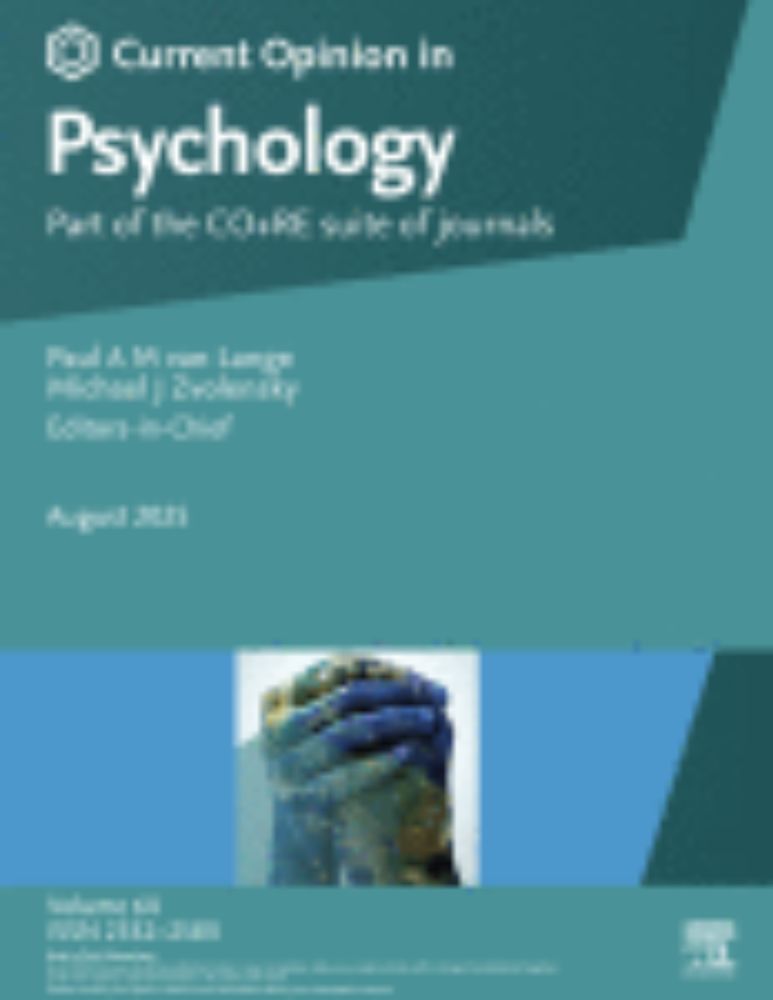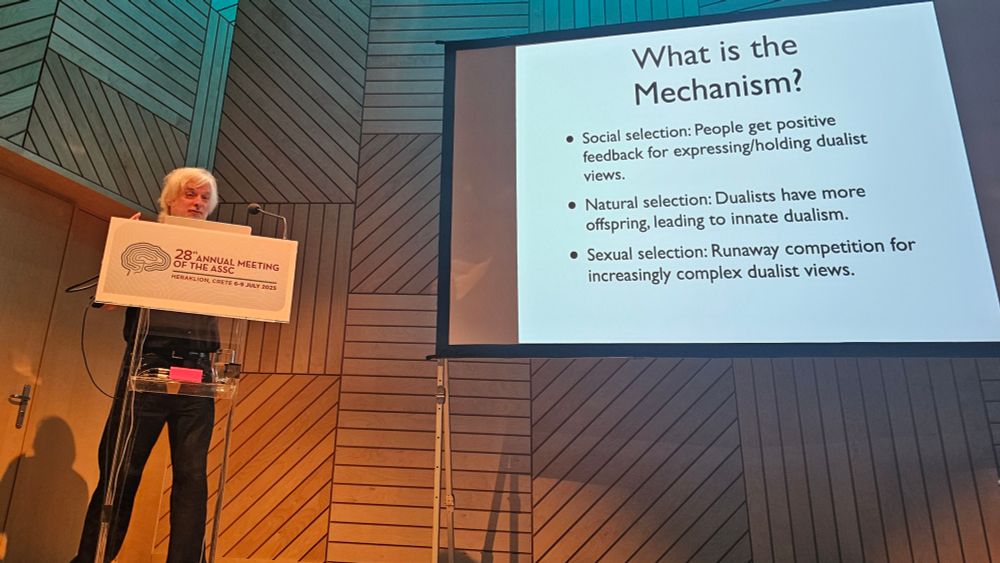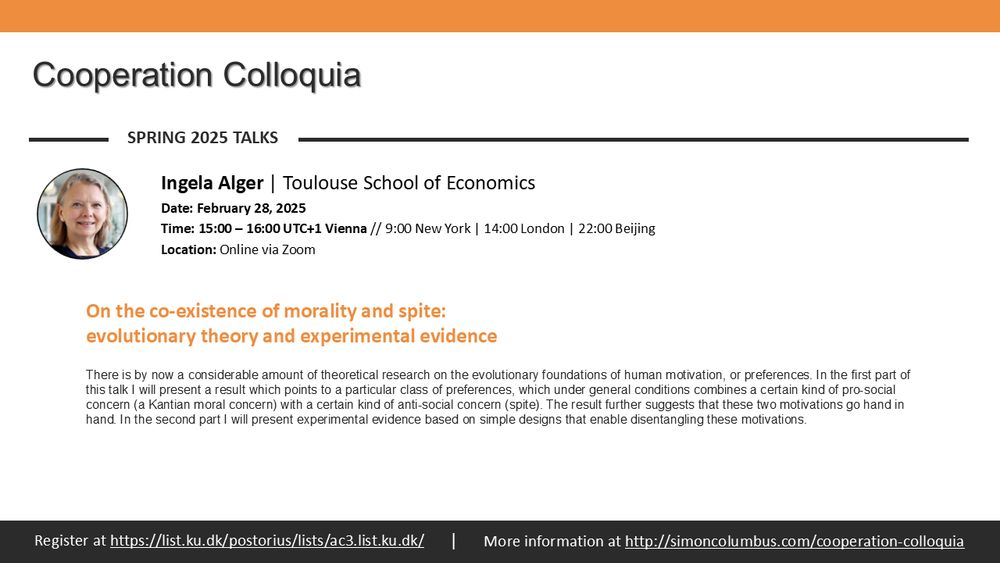Oh cool, thanks for this - I'd never heard of it!
12.01.2026 23:08 — 👍 1 🔁 0 💬 0 📌 0Toby Handfield
@tobyhandfield.bsky.social
Evolution of moral cognition and cooperation. Bit of epistemology, too
@tobyhandfield.bsky.social
Evolution of moral cognition and cooperation. Bit of epistemology, too
Oh cool, thanks for this - I'd never heard of it!
12.01.2026 23:08 — 👍 1 🔁 0 💬 0 📌 0
Some fields list authors alphabetically. Others use norms like "senior last". Others use order to signify relative contributions. In a new paper with @kevinzollman.com, we model the evolution of these norms, and then look at which type of norm is best for science. doi.org/10.1098/rsos...
11.01.2026 22:03 — 👍 29 🔁 13 💬 2 📌 1Highly highly recommended! The place is great and @cmolho.bsky.social is fabulous to work with!
02.12.2025 09:04 — 👍 1 🔁 2 💬 0 📌 0
Happy #WplusEBSWednesday, folks!
This week, we're spotlighting the Toulouse Summer School in Quantitative Social Sciences (May 26–June 19), hosted by @tse-fr.eu and @iast.fr .
Applications due Dec. 15!
Great opportunity for PhD students - check it out at the link :)
www.tse-fr.eu/toulouse-sum...

Some philosophical easter eggs... 🌷🌼🐇https://www.maxnoichl.eu/blog/2025/easter-eggs/
20.04.2025 15:07 — 👍 0 🔁 1 💬 0 📌 0
"reluctant altruism represents a fundamental aspect of human social behavior... the evidence points to reluctant altruism being guilt-driven"
19.07.2025 22:06 — 👍 1 🔁 1 💬 0 📌 0“widely adopted practices like senior-last positioning and alphabetical ordering may function as institutional frictions that impede valuable scientific collaborations rather than neutral organizational conventions, potentially reducing overall scientific productivity across affected disciplines”
16.07.2025 18:32 — 👍 4 🔁 4 💬 0 📌 0
New preprint from @tobyhandfield.bsky.social and me!
We analyze authorship order norms from two perspectives: (1) why do disciplines have different norms and (2) do those different norms affect what kinds of collaborations take place.
arxiv.org/abs/2507.07364
Big iff true.
www.cambridge.org/core/journal...

Here's the aforementioned paper.
arxiv.org/abs/2507.07364

Dave Chalmers and the best argument for dualism #ASSC28
09.07.2025 08:59 — 👍 62 🔁 12 💬 8 📌 2Here's a start to a mathematical philosophers starter pack. I'm having a hard time keeping track of who is here these days. Apologies if I missed you. Let me know if you want to be added or removed, or if you know anyone else who should be on here.
23.11.2024 17:41 — 👍 159 🔁 48 💬 26 📌 3Undergrads interested in philosophy of science? Please share that applications are open for our summer development program! lpssdp.com?fbclid=IwY2x...
20.03.2025 03:35 — 👍 21 🔁 25 💬 0 📌 0
Abstract: There is by now a considerable amount of theoretical research on the evolutionary foundations of human motivation, or preferences. In the first part of this talk I will present a result which points to a particular class of preferences, which under general conditions combines a certain kind of pro-social concern (a Kantian moral concern) with a certain kind of anti-social concern (spite). The result further suggests that these two motivations go hand in hand. In the second part I will present experimental evidence based on simple designs that enable disentangling these motivations.
Cooperation Colloquium this week:
Ingela Alger (@ingelaalger.bsky.social)
On the co-existence of morality and spite: Evolutionary theory and experimental evidence
Friday Feb 28, 15:00 UTC+1 (Vienna) / 9 am NYC
Sign up: list.ku.dk/postorius/li...
"Sure, the last 1000 grad students failed to solve the problem of induction, but that's no reason to think I can't do it."
26.11.2024 21:16 — 👍 34 🔁 12 💬 3 📌 2Ever the cheery one! 😉
25.11.2024 06:49 — 👍 0 🔁 0 💬 0 📌 0Here is my start! I'm having a hard time keeping track of who is here these days. Apologies if I missed you. Let me know if you want to be added or removed, or if you know anyone else who should be on here.
23.11.2024 17:42 — 👍 47 🔁 13 💬 9 📌 0